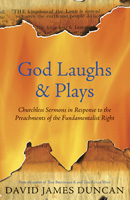I’ve always heard about David James Duncan’s writings. First it was “The Brothers K”, which I initially thought was someone’s nickname for “The Brothers Karamazov”
– I thought they were just trying to be cute, until I realized that it was one of Duncan’s novels. Then a Whitworth writing professor told me I really should read Duncan’s “The River Why” – and then it was assigned to be read for a course this semester. Duncan’s love of nature and the search for truth, beauty and wisdom is intoxicating. To read one of his novels is to be swept up into the lives, despairs and hopes of his characters’ experiences.
I have a tremendous respect for Duncan’s thoughts on spirituality and religion. As one who is pursuing an open & progressive spirituality and theology, I find much of his writing very refreshing. I am also married to someone who just finished a course on Ecology and we are beginning to learn about ways to live as good and faithful stewards of God’s creation, reducing, reusing and recycling (yes, that’s right, the 3 Rs) and being conscious about what food we purchase & consume.
 Duncan’s newest book, God Laughs & Plays: Churchless Sermons in Response to the Preachments of the Fundamentalist Right
Duncan’s newest book, God Laughs & Plays: Churchless Sermons in Response to the Preachments of the Fundamentalist Right is a wonderful book. It’s a compilation of essays on conservation, salmon, spirituality, politics – all the while weaving a strong mysticism through all of it. One of my favorite essays was “Bush Administration Sacks Narnia,” in which Duncan compares Bush and his administration of deceiving America like Shift the ass deceived Narnia in C.S. Lewis’ “The Last Battle.”
Other favorites included “Unsaying the Word ‘God'”, in which Duncan discusses apophatic theology and “No Great Things”, where he looks at the current ecological state of the world and discusses little things that help keep him from continually being depressed at the state of the world. The last essay proves to be his most cosmological/mystical and profound as he admits his bent toward mysticism here and ends the book with this:
I still have no rational idea what it means when consciousness revs up and perceives mystery amid mind, amid life, amid matter. But oh do I have images of what it means! If we are ever to rise to new levels of consciousness or to the Beauty that is Truth, we’ve got to describe our perceptions as consciousness truly perceives them. I therefore confess my lifelong love for a wilderness found outside myself, till once in awhile I encounter it within…If I stake my life on one field, one wild force, one sentence issuing from Sinai it is this one: There is no goal beyond love.”
One thing that irritated me at first about the book was Duncan’s insistent quoting of Matthew 6.6: “But when you pray, go into your room, close the door and pray to your Father, who is unseen. Then your Father, who sees what is done in secret, will reward you.” It seemed to be a nice way for him to not discuss anything spiritual/religious, and it seemed like he was arguing for a very secretive/individualistic spirituality. However, in his “Christian Matters I” essay, he discusses the profound need for spiritual community, which is what I was hoping he would say:
“Our lack of community is intensely painful. A TV talk show is not community. A couple hours in a church pew each Sabbath is not community…Without genuine spiritual community, life becomes a struggle so lonely and grim that even Hillary Clinton has admitted ‘it takes a village.'”
Duncan offers sharp, prophetic criticism against the Religious Right and a fundamentalist vision of what Christianity is supposed to be. While his spirituality may be too inclusive for some readers, his voice is an important one for Christianity and politics today. Much like Brian McLaren and Jim Wallis, Duncan looks for a new way to be Christian in this world, and focuses heavily on the IN THIS WORLD part. The Fundamentalist eschatology does nothing to help the ecological state of our world, and so we need voices and spirits like Duncan who will be mystics and prophets and call all of us to action.
David James Duncan is a modern-day mystic who should be listened to. He is incredibly well-read in ancient Wisdom literature and brings a very inclusive spiritual perspective to his writings. Duncan’s progressive politics and spirituality are refreshing and of course, if you’ve read any of his writings, his humor is great as well. I highly recommend this book.